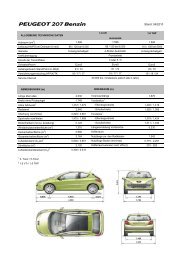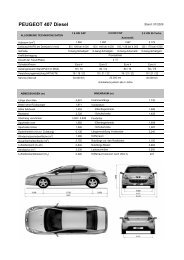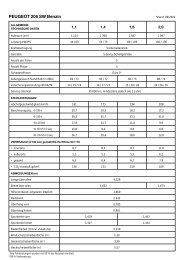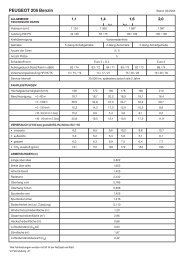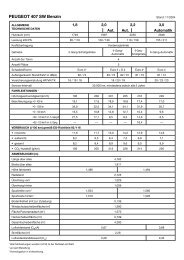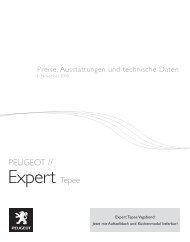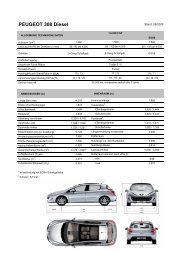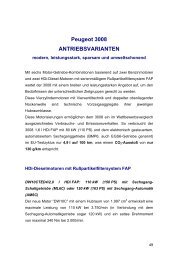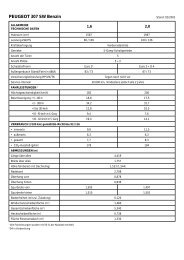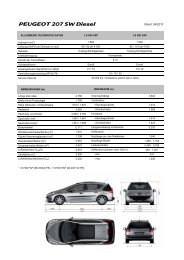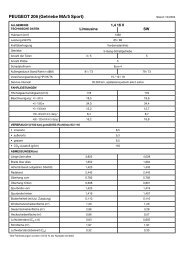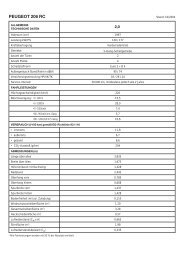PSA COUV page . page RA GB - PEUGEOT Presse
PSA COUV page . page RA GB - PEUGEOT Presse
PSA COUV page . page RA GB - PEUGEOT Presse
Create successful ePaper yourself
Turn your PDF publications into a flip-book with our unique Google optimized e-Paper software.
E nvironmental Stewardship<br />
OPTIMIZING RECYCLING<br />
AND REUSE THROUGH<br />
ECODESIGN PRINCIPLES<br />
Ecodesign is a process that builds<br />
environmental concerns into projects<br />
from the design phase. Embraced by<br />
<strong>PSA</strong> Peugeot Citroën engineers, it<br />
has led to the use of new materials,<br />
in particular thermoplastics such<br />
as polyethylene, polyurethane,<br />
polypropylene and polyamide that<br />
are easy to recover and recycle.<br />
Today, materials used to make cars<br />
have to meet increasingly stringent<br />
criteria. The latest developments<br />
include:<br />
- Using a single family of plastics per<br />
major function, so that an entire<br />
sub-assembly can be recycled<br />
without prior disassembly.<br />
- Reducing the variety of plastics in<br />
a car, to optimize the related<br />
recovery processes and ensure<br />
their profitability.<br />
- Marking plastic parts with<br />
standardized codes, to ensure<br />
identification, sorting and<br />
traceability.<br />
- Using recycled materials.<br />
DESIGNING FOR DISASSEMBLY AND REUSE<br />
<strong>PSA</strong> Peugeot Citroën’s environmental<br />
stewardship commitment covers the entire<br />
product life cycle, from design to<br />
disassembly. A European Union directive<br />
stipulates that as of January 1, 2006, at<br />
least 85% of a scrap vehicle’s average<br />
weight must be capable of recovery and<br />
reuse, with the rate rising to at least 95%<br />
by January 1, 2015. Peugeot and Citroën<br />
vehicles will comply with the 95%<br />
recyclable rate from 2005.<br />
In response to the July 1, 2003 ban on the<br />
use of mercury, cadmium, lead and<br />
hexavalent chromium in new vehicles, the<br />
Group in 2002 deployed a wide-ranging<br />
initiative that required its 800 suppliers to<br />
provide compliance certificates for all their<br />
deliveries or for each part supplied for<br />
forthcoming vehicles. The response rate<br />
by year-end demonstrated an assertive<br />
commitment to compliance in this area.<br />
In addition, substitutes for parts and<br />
materials containing heavy metals were<br />
developed by the Group’s engineering teams<br />
to ensure that Peugeot and Citroën models<br />
are free from any heavy-metal content.<br />
PRODUCTION PLANTS AND THE<br />
ENVIRONMENT<br />
GLOBAL PRINCIPLES<br />
Safeguarding the environment at<br />
manufacturing plants and protecting the<br />
quality of life in neighboring communities<br />
have long been critical priorities for<br />
<strong>PSA</strong> Peugeot Citroën. Guided by the principles<br />
of continuous improvement, risk prevention<br />
and regulatory compliance, this commitment<br />
is deployed at all Group facilities worldwide.<br />
The corporate risk prevention and<br />
management department includes an<br />
environmental section with its own capital<br />
plan. In addition, on each Automobile<br />
Division site, an environmental manager<br />
is backed by a dedicated organization and<br />
correspondents appointed in each<br />
workshop and facility. In 2002, around<br />
500 people were involved in managing<br />
the Group’s industrial environment.<br />
CURBING GREENHOUSE GAS EMISSIONS<br />
• Reducing VOC emissions<br />
In France, automobile plants account for<br />
76<br />
<strong>PSA</strong> <strong>PEUGEOT</strong> CITROËN - MANAGING BOARD REPORT




